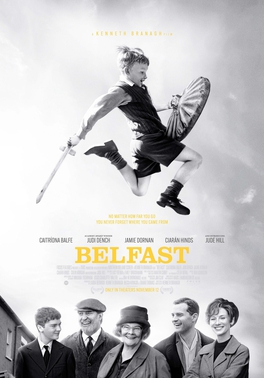Images in Review: Belfast is a triumph in black and white
December 8, 2021

In the opening scene of actor and director Kenneth Branagh’s semi-autobiographical film Belfast, young Buddy is called home by his mother for tea. The summons is transmitted through a chain of kindly neighbors and playing children; it reaches him in the middle of the street, just as he lands the winning blow of a pretend fantasy battle. He laughs, pumps his fist, and starts to trek home. Then, chaos: The camera revolves around Buddy as he watches a crowd of Protestant rioters advance on his street, smashing windows and hurling Molotov cocktails. Suddenly, he is terrified, his utopia destroyed. Belfast, the capital city of Northern Ireland and Buddy’s home, is in flames.
Branagh’s greatest achievement of the film is precisely this blend of sunny childhood nostalgia and horrific violence. He conceptualizes the period of unrest from the 1960s to 1998 between Irish Catholics and Protestants known as the Troubles as a backdrop for Buddy’s personal growth, to great effect. Young Jude Hill is a standout in the role, bringing a wide-eyed expressiveness that injects both humor and heart into static scenes. The film is at its best when it follows Buddy’s adventures with sincerity; his attempts at romance with a young Catholic classmate are pure fun, and Hill brings a charmingly outsized panic to Buddy’s unsuccessful theft of a chocolate bar. Less compelling are the more climactic sequences of the film. Buddy’s father (Jamie Dornan) becomes embroiled in a quarrel with a neighborhood leader that culminates in a Western-style street standoff, which pays homage to Buddy’s favorite television programs but feels too grandiose for what is, fundamentally, a child’s account of provincial life amid a larger conflict.
Overall, performances by the older cast are stellar. Catriona Balfe deserves particular note for her role as Buddy’s mother. As she reckons with grief for the simple way of life that she and her children have always known, Balfe is nonetheless electric and confident. Audiences will also find Judi Dench a standout as Buddy’s grandmother; her struggle with loss is the subject of a shift in focus at the end of the film. Buddy moves on to new adventures, but Dench’s quiet collapse into sobs is a reminder that the Troubles would continue for another thirty years, with loss of life numbered in the thousands and Northern Irish families left to face the crippling effects of displacement, military occupation, and frequent unrest. Branagh’s balance of joy and grief is both profound and haunting, striking a chord that few have managed since Stephen Daldry’s Billy Elliot.
The visuals of the film are beautiful, with rich black-and-white cinematography from Branagh’s longtime collaborator Haris Zambarloukos. Belfast’s angular back alleys, courtyards, and side streets are lovingly explored, and Jim Clay’s expert production design is given full play in lingering shots of the sparse rooms and cluttered workshops belonging to Buddy’s parents and grandparents. The tight focus of the setting and the constant presence of a military barricade in the background provide Buddy’s street an element of surreality, as if his life is literally taking place on a movie set — incidentally, the clips of movies that Buddy goes to watch are the only sections of the film rendered in color. This surreality lends a sense of tenuous protection to Buddy’s day-to-day life, which makes the intrusion of riots and looting all the more brutal to watch. As masked teenagers flood the streets with bats and uprooted lampposts, one gets the sense that a fantasy is being shattered.
Outside of violence, the larger world is only allowed to permeate through a series of establishing shots, in which Belfast twinkles with light or broods under clouds. Branagh finds beauty in the still and quiet, and his deep love for the city is both subtle and foundational in the film. Sure to be a hit with voters in the coming awards season, look out for Belfast nominations at this year’s Oscars.
Belfast is now playing at Images until Dec. 9.








